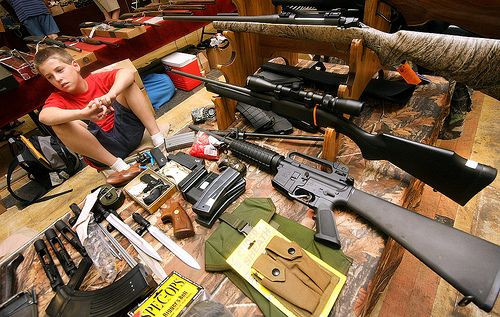Racism In White Americans Linked To Gun Ownership And Gun Control Opposition

A new study of symbolic racism among white American voters yielded strong links between latent biases toward blacks and increased favor of gun ownership and oppositions toward gun control.
Published in the journal PLoS One, the study used voter data of white Americans that, after accounting for political ideology, income, and education, still revealed startling connections between racism and gun ownership. For every one point increase in symbolic racism — measured on a five-point scale — the chance someone had a gun in the home rose by 50 percent, and the chance the respondent supported policies that allowed people to carry concealed guns rose by 28 percent.
Symbolic racism is less obvious than blatant or overt racism. It deals more with attitudes than actions, suggestions instead of slurs. The blatant racism of Jim Crow laws, which relegated blacks to the backs of buses and subjected them to many other inequalities, have been replaced, the researchers assert, by more discreet forms of discrimination. These are reflected in wide support for policies that statistically hinder blacks, such as longer prison sentences, and opposition to programs that may benefit them, such as welfare.
Judging racism can be tricky, as it lends itself to interpretation quite frequently. Researchers formulated questions that they believed illuminated racist attitudes in respondents. One question, for instance, asked "How well does the word 'violent' describe most blacks?" The greater the relationship assigned to the two measures, the more the respondent was thought to be symbolically racist.
"We were initially surprised that no one had studied this issue before,” said study co-author Dr. Dermot Lynott, from Lancaster University, in a statement. “However, the U.S. government cut research funding for gun-related research over decade and a half ago, so research in this area has been somewhat suppressed."
The research team also found that for each one point increase in racism, the chances a respondent opposed legislation banning handguns at home rose by 27 percent. When controlling for current gun owners, that figure dropped to a statistically insignificant 17 percent. However, researchers say this drop is explained by the added self-interest that arises, as gun owners must now give up their own gun. Presumably, gun owners own their guns specifically because they believe guns should be in the home.
Gun control debates are set against a bleak backdrop of school shootings, homicides, suicides, and gun violence in a country that routinely tops the list for most gun-related deaths in a given year. A study performed earlier this year found that the more guns a U.S. state owns directly relates to an increased homicide rate. Covering 30 years from 1981 to 2010, and controlling for a laundry list of variables, it is the largest and most comprehensive study to date examining homicide’s relationship to gun ownership.
Each year, approximately 38,000 people suffer gun related deaths in the U.S. By 2015, total deaths related to guns are expected to exceed all traffic fatalities.
"Coming from countries with strong gun control policies, and a 30-fold lower rate of gun-related homicides, we found the arguments for opposing gun control counterintuitive and somewhat illogical,” said co-author Dr. Kerry O’Brien, from the University of Manchester and Monash University, two British universities that, along with Lynott’s research headquarters, reside in a country where 6.2 people per 100,000 own a gun.
In the U.S., that rate is 88 per 100,000.
“For example, U.S. whites oppose gun control to a far greater extent than do blacks, but whites are actually more likely to kill themselves with their guns, than be killed by someone else,” O’Brien added. “Why would you keep them? So we decided to examine what social and psychological factors predict gun ownership and opposition to gun control."
Part of the answer is simply freedom. Americans whose family is steeped in the traditions of southern conservatism tend to enjoy exercising their second amendment Constitutional right. Another is irrationality, or an ignorance of the facts. Gun ownership often proceeds under the assumption that one will be attacked. So people buy guns fearing someone else will use one on them, despite the supposed closeness of people inhabiting gun-heavy regions.
The present study also found associations in their data between opposition to gun controls and conservatism, anti-government sentiment, party identification, and being from a southern state. Even controlling for these factors, the team found racism associated with gun control opposition and gun ownership.
O’Brien suggests that further research into the issue should investigate why people commit certain biases and how those missteps could translate into larger consequences.
"The study is a first step,” he said, “but there needs to be more investment in empirical research around how racial bias may influence people's policy decisions, particularly those policies that impact on the health and wellbeing of US citizens."



























